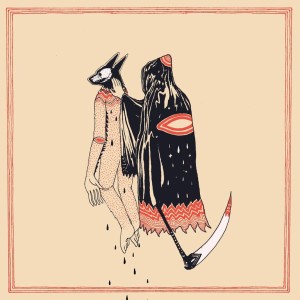By Jake Tully
With his sophomore release, Spirit’s Furnace, out on April 15th, Brooklyn-based act the Bones of J.R. Jones (a.k.a. Jonathon Linaberry) has quite a bit to express about the woes of life, internal turmoil and the twisted inner sanctum of survival. Linaberry, who considers himself an astute admirer of the blues progenitors of early part of the last century, has developed a sound that stems from his days in punk rock to a new brand of singing and songwriting, all the while maintaining a thoroughly familiar Americana sound. Through the persona of J.R. Jones, Linaberry has delivered his message on record through a darkly emotive lens in addition to performances on stage in a mystifying and singular manner. Elmore Magazine got the opportunity to speak to Linaberry about his latest record as well as his developments in crafting the Bones of J.R. Jones.
Elmore Magazine: Spirit’s Furnace is your second outing as the Bones of J.R. Jones. There always seems to be some lofty expectations from the second album from critics and the listening public at large. Was there any pressure with the expectations that seem to come from a sophomore release?
Jonathon Linaberry: It’s funny, I didn’t really even think about it in terms of being a sophomore release (laughs). I think there’s definitely a certain amount of pressure just in terms of the release. There was a lot of internal pressure that came from me in terms of making strides, keeping momentum and being gathered. I wanted to see growth more than anything else. For me that was the biggest pressure of all.
EM: Did you feel like you achieved some growth through making the record?
JL: Yeah! I think I definitely made some strides, creatively. I’ve always been very hesitant about going into the studio and creating songs that I couldn’t perform live. I’m only one person up there on stage and having that fuller soundscape on a studio recording is a little intimidating. I felt successful at times and unsuccessful at times, so in that sense I’ve seen some nice growth.
EM: Your music gets billed as very dark and foreboding. Upon listening to Spirit’s Furnace the first time it didn’t seem very heavy, but with a few more spins they certainly developed to be darker. Was that your intent?
JL: No, not at all. I found that maybe relying on the songs being dark was sort of a crutch to begin with. In terms of content, it’s more of an exercise for me in terms of getting out these darker feelings. As far as the songwriting goes I feel as though I write songs that have a pretty catchy melody – they get in my head anyway. For me anyways, I think the contrast of that and the darker lyrics is something that is just interesting to explore.
EM: Considering you started out in the punk scene and worked your way to something more Americana, do you feel that your roots are permeating into your current music at all?
JL: Yeah, I wholeheartedly think that’s true. It’s something I hadn’t reflected on until more recently. I grew up in central New York, and there’s not a lot to do up there. The punk and hardcore scene was something we did every weekend growing up. The reason I loved it so much was because it was something you could pour yourself into and be totally passionate about and wild. I feel like the transition from something like that into the old blues musicians feels pretty seamless. That’s a fairly logical transition for a lot of musicians to make. What I loved about the punk scene is reflective in the music of these old blues guys. They weren’t the most technically gifted people in the world, but it was all heart. That was what made me fall in love with the Americana scene and it made the transition easy.
EM: Were there any records or artists in particular that led to forming your sound?
JL: It’s hard to pinpoint anything specifically, but the first blues musician I heard that really stuck with me was Blind Lemon Jefferson. That must have been back in 2000 or so. I was in someone’s dorm room at the time and he came on and I thought to myself, “What is this?” I had never heard anything like it before. That was the starting point for me. You then start to expand your search and begin to consume to altogether. Beyond BLJ there wasn’t one particular musician I can attribute my style to. I love RL Burnside and Son House and Tom Waits – I think those are close as I can get to distinct influences.
 EM: How has the persona of the Bones of J.R. Jones developed for you as an artist? Was there growth in that respect through this record?
EM: How has the persona of the Bones of J.R. Jones developed for you as an artist? Was there growth in that respect through this record?
JL: It’s tough to say. I’m constantly writing, but in doing Spirit’s Furnace my writing was kind of piecemeal. I wish that I could be more thoughtful with my writing. You always hear these romantic stories about a musician going off to a cabin or having some self-exile to a location and basically doing all of their writing there and having a really thoughtful theme to that process. Unfortunately, where I am currently I can’t afford to that at this point. In terms of my process reflecting to the growth of the Bones of J.R. Jones, there’s a growth that made it to the album in terms of better fleshing out the personification of that, but – and this is me being self-critical – there’s no overarching theme for that persona that attach to. The album was music-driven underneath that already formed persona.
EM: So in reality the persona was ancillary to the storytelling?
JL: Yeah. I like being the Bones of J.R. Jones and playing underneath that name, but I’m hyper-aware. I don’t want it to be a stage character. I don’t want to get up there and have people think, “This is what the Bones of J.R. Jones will be singing about today,” that feels very trite to me. Most of what I do is semi-autobiographical and I refract that through this light of the persona – it’s hard for me to figure out where it will end up. Even if I have a goal for it, that usually doesn’t pan out (laughs.)
EM: You’ve received a lot of positive reviews for your touring in that you’re essentially going up on stage as a one-man band. Has that changed in playing material from Spirit’s Furnace?
JL: It hasn’t changed much yet. I’d love to grow and bring in some other people onto the stage. I think doing it by myself is a simplified process, but I hope that in the next possible months as I try out this record more that I could possible try out a drummer or a bass player and see where things can potentially go.
EM: Is there anything you want to impart to listeners about the new record?
JL: I’m definitely happy with the way the album came out. There’s a song on the album twice in two different versions called “Dried Dirt,” and the reason I did that was because I had been working on that song for the better part of 5 years. It’s really been the bane of my existence and my wife’s existence too because she’s had to hear it so many times in so many different ways. For me, getting that song on the album was a highlight because I finally deemed it worthy of releasing to the world.
Spirit’s Furnace came out on 4/15 and can be purchased through the Bones of J.R. Jones’ website. Linaberry will be performing 4/23 at the Brown Folk Festival 2016 in Providence, Rhode Island, 5/17 at the 8×10 in Baltimore, 5/22 at Rex Theater in Pittsburgh and 6/3 at the Durango Blues Train in Durango, Colorado.




Be the first to comment!